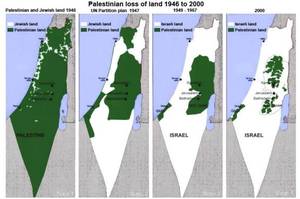Amended on 13/5/2007; links updated 29/5/2011.
 Between 11 and 14 June (and this is one reason why Fortnightly Mailing has had a hiatus) - just prior to the current crisis in Gaza - I was fortunate to go to East Jerusalem and Hebron, Ramallah, and Bethlehem in the West Bank.
Between 11 and 14 June (and this is one reason why Fortnightly Mailing has had a hiatus) - just prior to the current crisis in Gaza - I was fortunate to go to East Jerusalem and Hebron, Ramallah, and Bethlehem in the West Bank.
The visit was my first to the Middle East. I went with John Cook, who is President of the Association for Learning Technology (ALT), by which I am employed half-time. The visit was funded by the British Council and its focus was on how universities in the Palestinian Territories are using e-learning.
A short article will appear about the e-learning side of the visit in the ALT Newsletter. The continuation post is more of a personal reflection.
For Palestinians in the West Bank, life is tough, though not as tough as it is in Gaza. Issues include: isolation, the economic crisis, political and military conflict, a day-to-day life beset by having to pass through checkpoints, by Apartheid-style pass-laws, and by a physical landscape dominated by the wall, by the “settler roads” (from which most Palestinians are excluded), and by the continuing spread of Israeli settlements. Above right is a picture of an Israeli settler house in the traditionally Palestinian area of East Jerusalem; above left is a representation of how the West Bank has gradually been encroached upon since 1967.
A common sight on the West Bank is Israeli-flagged, fenced-in hilltops with a few prefabricated buildings - the beginnings of a settlement; sometimes there is just a fenced area as a "statement of intent"; and there are many, bigger, solidly built clusters of houses ranging from villages to medium-sized towns, with tower cranes showing that building continues.)
The ~450 km wall Image © ThinkAndAsk, is still being built. It snakes its way around, running roughly along the Palestinian side of the 1967 boundary, but with long incursions deep into the West Bank, so as to enclose Israeli-settled land, and keep it connected to Israel. This results in Palestinians being arbitrarily cut off from each other, or from their land, or their fields; and in houses being demolished or overshadowed.
 At Bethlehem University we saw a missile-hole, made in March 2002, in the exterior wall of the university's library. (The picture at the top of this post is a close-up.) We were told that 4 (some reports say 7) US-made Israeli missiles had hit the university, which had just previously had some extensive new building work funded with grants from the US and EU. (The missiles, apparently, cost about the same as the new building work).
At Bethlehem University we saw a missile-hole, made in March 2002, in the exterior wall of the university's library. (The picture at the top of this post is a close-up.) We were told that 4 (some reports say 7) US-made Israeli missiles had hit the university, which had just previously had some extensive new building work funded with grants from the US and EU. (The missiles, apparently, cost about the same as the new building work).
In summary, then, a disturbing visit, which left me certain that the "Palestinian Question" (which for me is really also an "Israeli Question") must be solved; and much more confident about articulating this. Unfortunately, this side of a major shift in the balance of forces within Israel, and without a big shift in US policy on the Middle East it is hard to see how. To quote Daniel Barenboim from the 4th 2006 Reith Lecture (I assume that Barenboim takes it as read, as I do, that acceptance of the practical legitimacy of the state of Israel, if not that state's policy and conduct, is a given): "until Israelis accept the legitimacy of the Palestinian narration, nothing will move, not only in the way that you Palestinians want but in a way that is humanly just".
Useful resources:
Palestinian Academic Society for the Study of Academic Affairs (PASSIA) - "PASSIA is not affiliated with any government, political party or organisation, and maintains a completely independent financial and legal status". The PASSIA website contains most of the excellent data and diagrams in the 2006 Passia Diary.
Guardian Unlimited Special Report on Israel and the Middle East and BBC News in depth section on Israel and the Palestinians. Both of these are regularly updated.
Peace Now - the main Israeli peace movement: "one of the objectives of Peace Now is to convey the sense of the harm incurred to Israel not only by the economic and political aspects of continued occupation, but also the moral damage done to the values and fabric of Israeli society – in addition to the untold hardship incurred on another people, the Palestinians."
What Hamas must do - a 22/6/2006 article in the London Review of Books by Rashid Khalidi, Edward Said Professor of Arab Studies at Columbia University - unless LRB decides to open it up, you have to have a subscription to LRB to see more than the introductory paragraph.
The Iron Wall - a stunning 57 minute documentary released in 2006, describing mainly through the voices of Israelis and Palestinians, the origins of and effect of the wall, and the role of the settler movement. Highly recommended.
I merely belong to them - long review of "The Jewish Writings by Hannah Arendt ed. Jerome Kohn" in the 10/5/2007 London Review of Books by Judith Butler (Maxine Elliot Professor in the Departments of Rhetoric and Comparative Literature at Berkeley). Excerpt: "In 1948, after the UN had sanctioned the state of Israel, Arendt predicted that 'even if the Jews were to win the war [of independence], its end would find the . . . achievements of Zionism in Palestine destroyed . . . The "victorious" Jews would live surrounded by an entirely hostile Arab population, secluded inside ever threatened borders, absorbed with physical self-defence to a degree that would submerge all other interests and activities.' She stated once again that partition could not work, and that the best solution would be a 'federated state'. Such a federation, in her view, 'would have the advantage of preventing the establishment of sovereignty whose only sovereign right would be to commit suicide'."
Battered by unbowed [PDF] - The Higher Education Policy Institute's Bahram Bekhradnia discusses his experiences as an observer of Palestine's universities in this 29/12/2009 piece in the Times Higher.
Izzeldin Abuelaish - 29/5/2011 reflection by Donald Clark on a talk by Abuelaish, which caused me to revisit and spring clean this post.
Who cares in the Middle East about what Obama says? - a bitter 30/5/2011 essay by the Independent's Robert Fisk.
On 4/7/2006, partly in response to Ian Chowcat's comment below, I made some minor "for the avoidance of doubt" changes to this post's final paragraph. Link to The Iron Wall added 25/10/2006. Link to LRB article about Hannah Arendt's writings added 13/5/2007. Links to Bahram Bekhradnia's THE piece, Donald Clark's Izzeldin Abuelaish post, and Robert Fisk's essay added 30/5/2011.


This February 2006 2-part investigation by Chris McGreal of the Guardian provides interesting background:
http://www.guardian.co.uk/print/0,,5392485-103552,00.html
http://www.guardian.co.uk/print/0,,5393463-103552,00.html
Posted by: Dániel Molnár | 04/07/2006 at 09:37
It is sad that so much commentary on this issue is so one-sided. A more balanced view would mention the refusal of many Palestinian organisations to recognise the legitimacy of Israel, of its right to exist, and the reciprocal rights of self-determination for both peoples. It would also mention that Israel's mind-set has been formed through being surrounded by countries calling for its physical annihalation and by the brutal reality of suicide bombers in buses and pizza parlours. If in Barenboim's words Israelis need to "accept the legitimacy of the Palestinian narration" the same could be said in reverse. Unfortunately the cause of peace and justice is not served by the scapegoating of Israel that seems to be sweeping sections of the UL academic community of late, in betrayal of norms of balance and fairness. We need to develop perspectives that take the aspirations of both communities into account.
Posted by: Ian Chowcat | 04/07/2006 at 10:27
I too had a worrying visit to Israel and witnessed the obscene imbalance in power. This is not about simple mutual state recognition. The asymmetric nature of the conflict is now morally repulsive.
Massive foreign aid from US, decades of encroachment by settlement and the truly horrific imbalance of modern weaponry, against stones, small arms and home made rockets. The Palestinians are in desperate need of international support against US sponsored bullying.
Posted by: Donald Clark | 10/07/2006 at 21:35
The interesting point of Ian's comment is that he feels that so much commentary is one sided when the ovwerwhelming impression on a day such as today is that the Israeli Government is not short of access to the influential western media such as the BBC and the US news channels. As the articles in the Guardian on the Suez crisis show, this week, the State of Israel has colluded with the interests of Western States from early in its existence and that raising issues of balance can be addressed as much to right wing Israeli viewpoints as to Seb's piece which recorded his experience. It is helpful that Seb gave some exposure to a range of more sophisticated views on "the problem" than proponents of the more extreme views privileged by our media.
Posted by: Nigel Ecclesfield | 13/07/2006 at 12:02
Nigel's use of the phrase >>extreme views<< begs several questions. Unsophisticated is equated with extreme. 90% of Israelis apparently fully support their govenment's current actions - presumably because they feel under attack. It is possible to be simplistic when you want to defend your children. It requires no sophistication. The same applies on both sides.
Posted by: Martin Cooke | 21/07/2006 at 17:21
It is sad that human rights groups and education administrators and councils only go to the Palestinian side. Go see what is happening on the Israeli side, be balanced in your approach.
Israelis are not immune to suicide attacks and rocket fire. I really don't think you understand what it feels like waking up one day and hearing that your uncle was blow up in a coffee shop with his 3 year old daughter while getting coffee before dropping her off at school. But, whatever, I have come to expect this view as mainstream today. No one cares to be balanced and argue both sides.
Something that really bugs me is the idea that the Palestinian state has become the responsibility of the Israelis. Since when? They have had their chance, they will have more chances and they should finally capitalize on an opportunity instead of simply playing a blame game and crying all the time.
If you want something to happen you take the right steps to make it happen. You don't take a piece of land finally given back to you and turn it into a civil war and use it to attack civilians (Gaza) - that is not the right move, but again, Israel's fault, right?
Posted by: Michael Dub | 10/03/2009 at 15:03
Michael - You comment here on a piece I wrote in 2007. I think Antony Lerman's article in the 7 March Independent provides an ample counter to the pretty disreputable line of "argument" that you put forward in your comment above. Do not get me wrong, I am with Howard Jacobson on the fact that there is a vicious strand of anti-semitism "out there" in discourse about Israel and Palestine. But the actions of present-day Zionists aggravate rather than serve to resolve the situation in Palestine, and Israel's US-financed military intervention in Gaza earlier this year was wholly disproportionate, and will set back the cause of peace. Israel still needs to yield. Seb Schmoller
Posted by: Seb Schmoller | 13/03/2009 at 06:48